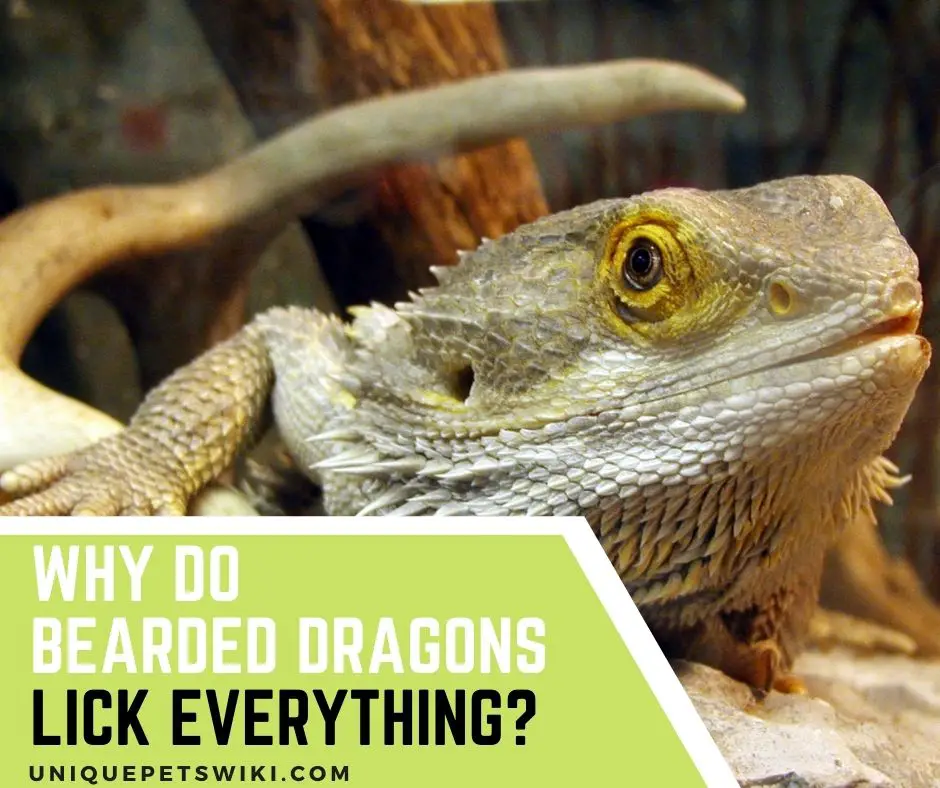It’s normal for reptile lizards to lick things in their cage, especially when they are just happy relaxing or exploring. But when should you get worried about their licking habit? “Why Do Bearded Dragons Lick Everything?” is the article you need to understand why your cutie beardie is licking everything in or outside its cage.
Your responsibility is to understand your bearded dragon’s routine and abnormal behaviors fully, and it is the only way to differentiate between a happy or stressed bearded dragon.
In your journey to understanding your bearded dragon’s behaviors, have you seen it licking everything? Well, it’s time to learn whether this is typical or abnormal behavior.
Bearded dragons are fascinating and curious creatures, and they have a peculiar way of understanding their environment.
And licking their surroundings is their way to understand their surroundings. Many bearded dragons owners are unsure if it is a usual behavior or a sign of stress.
Read this article to understand what licking everything means for bearded dragons. Keep reading!
Contents
- How Does Bearded Dragon’s Tongue Actually Work?
- Why Do Bearded Dragons Lick Everything?
- Licking Helps Bearded Dragon Explore
- Licking Helps Bearded Dragons Learn If There Are Any Predators Or Dangers Ahead
- Licking New Owners Because of Curious
- Bearded Dragons Want to Mark Territory
- Premating Behaviors for Beardies
- Bearded Dragon Also Lick If It’s Hungry
- Bearded Dragons Lick Their Lips if they are Thirsty.
- Health Risks When Bearded Dragons Lick Everything
- Distinguishing Bearded Dragon Is Sticking Its Tongue Out Or Licking
- Conclusion
How Does Bearded Dragon’s Tongue Actually Work?
Like most other reptiles, bearded dragons have a unique organ known as Jacobson’s or vomeronasal organs at the top of their mouth. Bearded dragons use the organ to familiarize themselves with their environment.
Bearded dragon’s tongues have many receptors to detect the microparticles when they lick the surface.
Bearded dragons then use these microparticles to send the information to Jacobson’s organ. In return, Jacobson’s organ analyses the particles sending the information about the surroundings to the brain.
Bearded dragons lick their surface more often in captivity than in the wild. They are more likely to encounter different environments as they don’t have movement limitations.
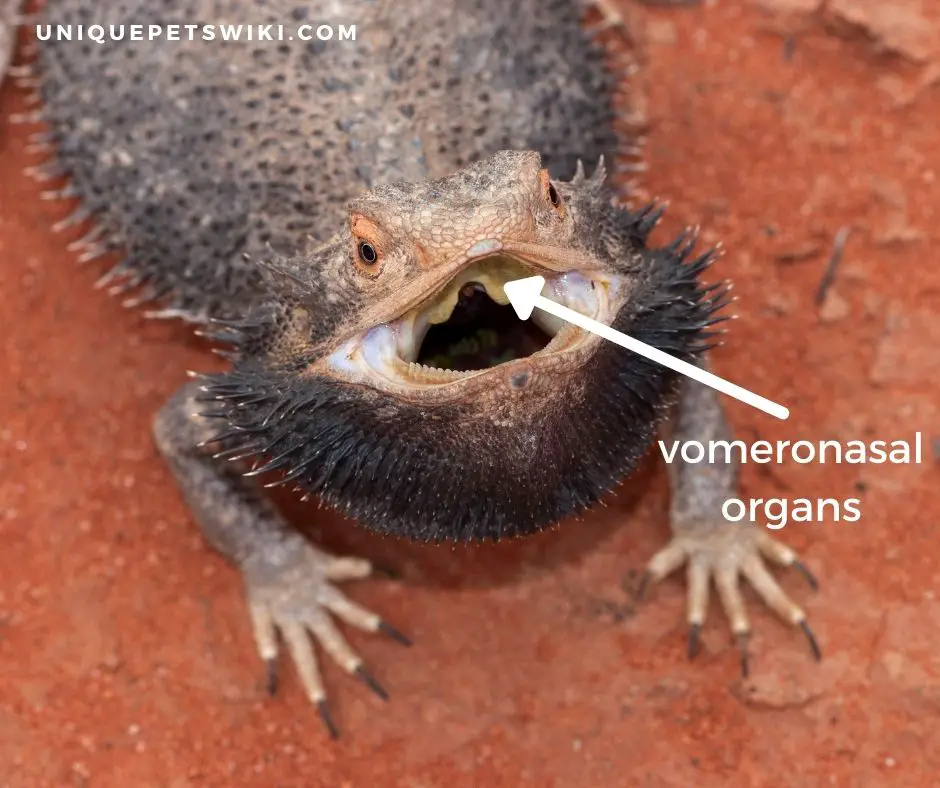
Also, they are likely to encounter many different animals and predators in the wild.
However, they will only get curious in the beginning in captivity. Once the bearded dragon assimilates with their environment, they no longer have to use their tongue to understand their environment.
Baby bearded dragons tend to be more adventurous than adults. Thus, they tend to lick the environment more than the adults.
As the baby grows, they feel more secure as they assimilate to their environment. Thus, they lick the surface less and less as they grow older.
Why Do Bearded Dragons Lick Everything?
Licking everything is a bearded dragon’s usual behavior. They will lick the air, objects, their owner, other pets, female or male bearded dragons, and any new thing in their environment. Each lick can be different.
For instance, they lick objects to familiarize themselves with the territory and their owner to identify personal scent and food to differentiate different tastes. Let’s now discuss seven reasons why your bearded dragon is licking everything.
Licking Helps Bearded Dragon Explore
Bearded dragons are pretty curious, and they will explore the environment until they are thoroughly familiar with their home.
Bearded dragons lick everything in their tank to get acquainted with their surroundings, including you.
Unlike humans who familiarize themselves with their surroundings using their eyesight, bearded dragons use their tongues.
They can even differentiate between their owner and a strange person after licking.
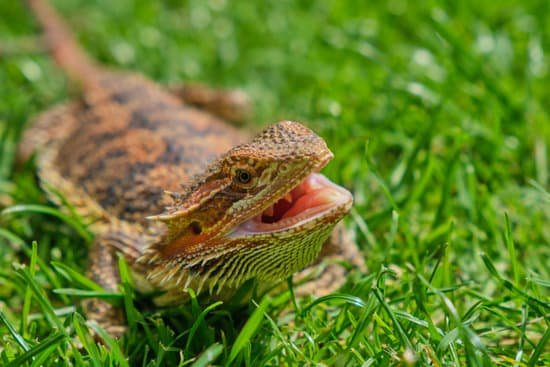
Babies, adults, females, and males will equally tend to lick everything in their surroundings until they fully feel secure and familiar.
However, as they get assimilated, adults stop licking their environment regularly unless you transfer them to a new environment.
But, babies are more curious and adventurous, and thus, they tend to lick their surroundings more than adults.
Males and females also lick each other during mating to identify their partners. And, if you house more than one male or female together, they will lick each other to mark their territory.
Remember, it is inadvisable to house more than one bearded dragon together unless you want to reproduce them.
Bearded dragons licking their surroundings is their normal behavior. However, too much temperature can also cause your bearded dragon to seem to lick the air.
Bearded dragons stick their tongue out while painting to release extra heat from their bodies.
Too much heat can cause health issues to your bearded dragons. Therefore, install thermometers in the bearded dragon’s cage to ensure the temperature is always at bay.
Licking Helps Bearded Dragons Learn If There Are Any Predators Or Dangers Ahead
Using the receptors in their tongue, bearded dragons lick their environment to collect microparticles that their Jacobson’s organs use to distinguish between predators, other pets, or even you and other members of your house.
Bearded dragons will keep off from any unfamiliar human or animal until they get assimilated to them.
Therefore, when bearded dragons detect unfamiliar animals in their surroundings, they first perceive them as predators.
When bearded dragons are unfamiliar with the people, objects, or animals in their territory, they exhibit aggressive behavior such as head bobbing and sticking out their tongues.
Wild bearded dragons are more likely to lick more to detect predators as they are more exposed to danger.
Also, baby bearded dragons lick the objects in their surroundings more as they are unfamiliar with most things.
Licking New Owners Because of Curious
Bearded dragons get curious about their new owner. They cannot trust you instantly, and thus they will lick you to collect pheromones that they send to their vomeronasal organ.
The organ will then help them distinguish you from other people or animals. When you bring a new bearded dragon to your home, it is essential to let them assimilate to their new environment without handling them.
During this time, you need to feed and clean their tank. Bearded dragons can collect pheromones during these few interactions and eventually familiarize you.
In general bearded dragons use their tongue to smell and taste.
Bearded Dragons Want to Mark Territory
Bearded dragons are pretty territorial, and they will lick anything and everything they perceive as theirs.
Housing more than one male bearded dragon will trigger territorial fights. Before the conflict, the dominant bearded dragon will lick others to collect pheromones.
Females can also lick other bearded dragon females when they get jealous of them mating within their territory.
It is, therefore, critical not to house more than one dragon in the same cage.
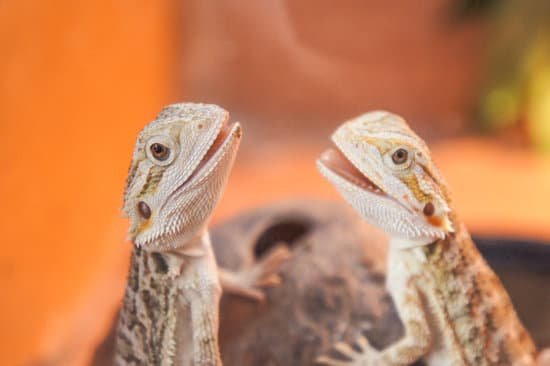
A dominant male will lick females to mark them as theirs.
Premating Behaviors for Beardies
Bearded dragons are extraterritorial during the mating season. A dominant male will lick females to mark them as theirs.
On the other hand, the female will lick their fellow females to determine whether they mated within their territory.
In the wild, Jacobson’s organ helps the bearded organ detect other bearded dragons within their territory.
Bearded dragons do not have to use this function in captivity as it is only advisable to house one male and female during mating.
Bearded Dragon Also Lick If It’s Hungry
The main reason bearded dragons lick their surroundings is to explore their new environment.
However, they can also lick your hands when hungry and associate your hands with food.
If you have recently touched your bearded dragon’s food, the smell on your hands may trigger them to lick you.
Bearded dragons use their tongue to smell and identify any new object in their environment.
Therefore, it is critical to wash your hands before handling your bearded dragons, as they can even bite.
If you introduce a new diet to your bearded dragon, it will use its tongue to taste and familiarize itself with the unique taste.
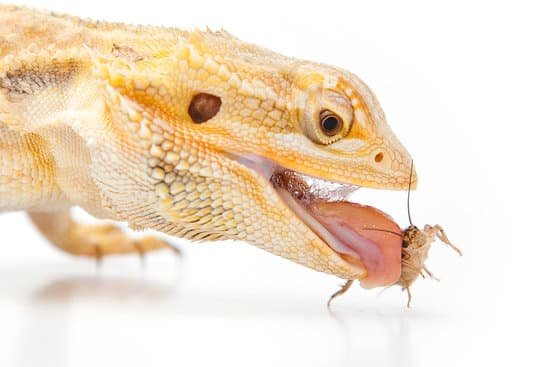
It is critical to have a consistent schedule for feeding your bearded dragon. Bearded dragons get stressed when hungry, and any stress can trigger illnesses and diseases.
Bearded Dragons Lick Their Lips if they are Thirsty.
Bearded dragon licking the air, objects, or surface area is normal behavior. However, licking their lips can be a sign of thirst.
When thirsty, bearded dragons tend to lick their lips. If you see your bearded dragon licking its lips, you should put drops of water in its mouth or nostril.
It is critical to keep your bearded dragon hydrated at all times.
Dehydration can cause improper shedding. And, it’s rare for bearded dragons to drink water from their water dish.
Therefore, keep your bearded dragon hydrated by misting objects near the water bowl and letting the water drops fall into it.
Bearded dragons rarely drink still water. Therefore, drinking from falling drips is the best way to keep them interested in water.
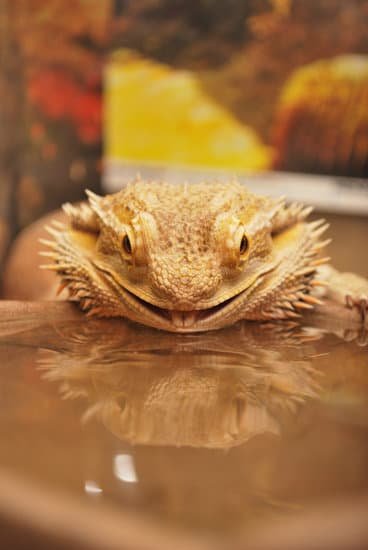
Health Risks When Bearded Dragons Lick Everything
Licking is normal behavior for bearded dragons that should not worry you. However, you should provide your bearded dragon with a safe environment.
While licking, bearded dragons can ingest small particle substrates such as sand. Sand ingestion causes impaction to bearded dragons.
Impaction is a common health issue for bearded dragons due to improper housing, such as using the wrong substrate.
As a pet owner, you should ensure that their environment is clean and free from the loose substrate.
Juvenile bearded dragons are more prone to impaction than adults, and they are more curious about their environment and thus tend to lick their surroundings more.
Even so, it would be best if you did not use dangerous substrate either on adults or juveniles.
See more about the best substrate for bearded dragons.
How Can You Tell if Your Bearded Dragon Is Impacted?
Impaction is a blockage in the intestines or gut that makes your bearded dragon experience difficulty in passing bowel. The ingestion of loose substrates mainly causes it.
Here are signs of impaction for bearded dragons.
- Constipation
- Lack of appetite
- Weight loss
- Lugging the hind legs
- Regurgitating
- Tiny protrusions around the spine
If you suspect your bearded dragon of being impacted, immediately consult a vet as it is a severe health condition that can lead to death.
A bearded dragon vet may have to perform surgery to save the pet. Enema and laxatives can also be options, but only a vet can tell.
Distinguishing Bearded Dragon Is Sticking Its Tongue Out Or Licking
A bearded dragon could either be licking or sticking out its tongue. They lick the air, objects, and surroundings out of curiosity to understand their environment. And, they stick out their tongue when it’s scorching or to show aggression.
When licking, a bearded dragon will be calm. However, if it’s sticking out the tongue and it’s panting or throbbing the head, it could be due to high temperatures or aggression.
While basking, it is possible for bearded dragons to stick out their tongues to release the excess heat.
During this time, the bearded dragon will seem to be panting while the tongue is out.
You can use a digital thermometer at all times to keep the temperatures at bay. The basking temperatures for bearded dragons should not exceed 1100F.
Also, if your bearded dragon is sleeping with its tongue out, it could be that the night temperature is too high.
And, if the bearded dragon’s tongue is out and it’s throbbing its head, it could be a sign of stress, or it’s feeling threatened.
Sticking the tongue out is expected if the bearded dragon is in a new environment. However, if the bearded dragon is in its usual place, it could be feeling threatened or stressed.
It would help if you looked for possible reasons stressing your bearded dragon.
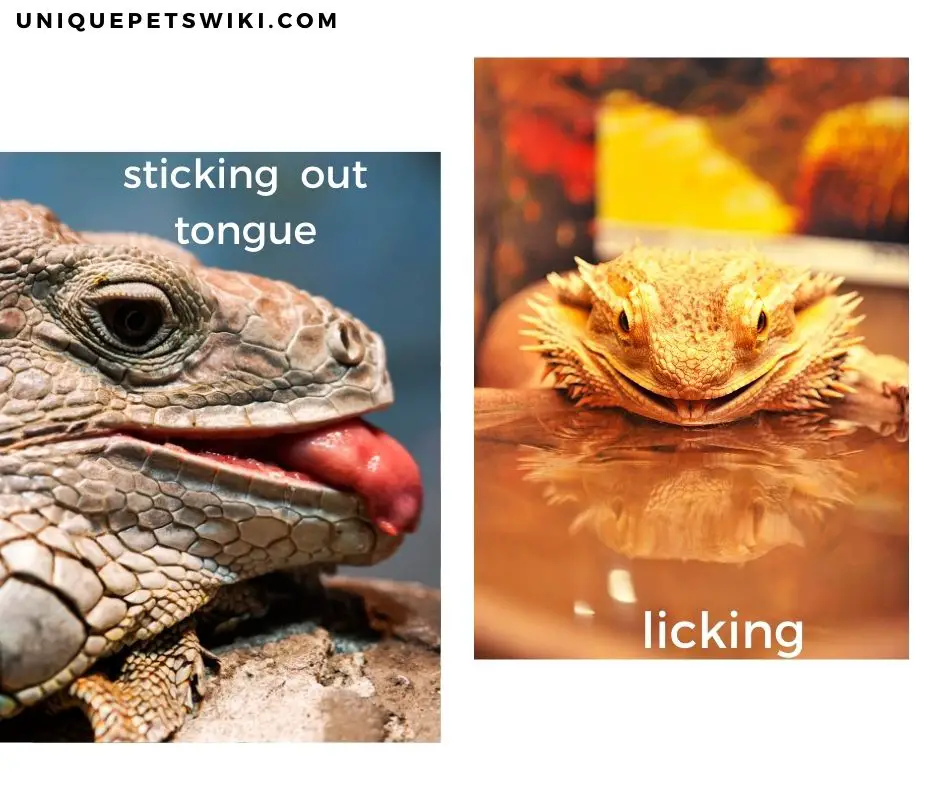
Conclusion
Bearded dragons are the “Philomath” of their world. They will explore and familiarize themselves with everything and everybody around them.
Luckily, they have a unique tongue with receptors that detect microparticles when they lick surfaces and better understand their environment.
We are happy you now understand your bearded dragon’s licking habits. All the best!
